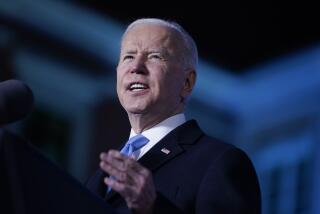Reagan Favors Immediate Tax Exemption of $2,000
WASHINGTON — President Reagan, after an extended White House debate on one of the key features of his tax simplification package, will propose boosting the personal exemption to $2,000 immediately rather than phasing it in over three years, Administration sources said Wednesday.
The decision is designed to mollify critics ranging from Rep. Jack Kemp (R-N.Y.) to Sen. Daniel Patrick Moynihan (D-N.Y.), who argue that the near-doubling of the personal exemption from its current $1,040 is necessary to relieve families under the poverty line from paying federal income taxes and to ensure that the tax burden does not shift to lower-income and middle-income groups.
Reagan’s plan would conform to the original Treasury Department tax simplification package released last year, which proposed raising the exemption to $2,000 in 1986, the first year the plan is supposed to go into effect.
Earlier this month, the White House tentatively proposed making the exemption $1,500 in 1986 and allowing it to increase gradually to $2,000 over three years. That change was designed to recoup billions of dollars in revenues that would be lost as a result of softening the original tax simplification package’s impact on business, investors and charities.
It was not clear what other alterations the White House would make in the overall tax package to permit an immediate increase in the personal exemption to $2,000. Congressional sources said that the Administration might drop its tentative proposal to allow corporations to deduct 10% of their dividends from taxation, a feature that was already scaled back considerably from the original Treasury suggestion that 50% of dividend payments be deductible.
Reagan plans to outline his tax proposal in a nationally televised speech next Tuesday. Like the original Treasury proposal, the package is supposed to collect about the same amount of revenue as the current tax system, although it is expected to raise the overall burden on corporations while lowering taxes modestly for the average taxpayer.
Giving Up Deductions
The plan would cut tax rates across the board, reducing the top personal tax rate to 35% from the current 50% and compressing the present 14 tax brackets to just three--15%, 25% and 35%. In return for lower tax rates, individuals would be asked to give up many existing deductions and exclusions, including the deduction for state and local taxes.
Under current law, the personal exemption, standard deduction and tax brackets increase annually with inflation, and they would continue to do so under the Reagan tax plan.
Separately, House Ways and Means Committee Chairman Dan Rostenkowski (D-Ill.) told steel industry executives in New York Wednesday that Reagan seemed to be accepting changes to the first Treasury proposal that would reduce its chances of obtaining congressional approval.
“The gap between the first Treasury package and the Reagan plan has set off some alarms around Washington as to the President’s commitment to real reform,” said Rostenkowski, whose committee must initiate all tax legislation. “If the President’s plan arrives leached of tough reform on the corporate side, the White House has little reason to look for enthusiastic support from Congress. If the plan is balanced in its appeal for sacrifice, if it truly favors lower- and middle-income taxpayers, then the President has reason to expect congressional help.”
Might Meet Objections
Earlier this week, Treasury Secretary James A. Baker III hinted that Reagan might meet the objections of Rostenkowski and some other congressional advocates of tax reform.
In response to a question at a Senate Appropriations subcommittee hearing on Tuesday, Baker said that the plan would not substantially alter the distribution of taxes among various income groups, although some individuals would pay more than now. “To the extent possible,” he said, “(the tax package) will be distributionally and economically neutral.”
More to Read
Get the L.A. Times Politics newsletter
Deeply reported insights into legislation, politics and policy from Sacramento, Washington and beyond. In your inbox three times per week.
You may occasionally receive promotional content from the Los Angeles Times.










